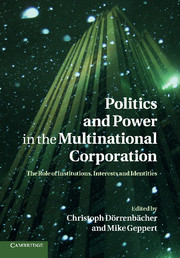 Politics and Power in the Multinational Corporation
Politics and Power in the Multinational Corporation Book contents
- Frontmatter
- Contents
- List of figures
- List of tables
- Notes on contributors
- Foreword
- Part I Introduction
- Part II Politics and power in MNCs: institutions, social embeddedness and knowledge
- Part III Politics and power in MNCs: headquarters–subsidiary relations
- Part IV Politics and power in MNCs: role of national identities and identity work
- 9 Subsidiary manager socio-political interaction: the impact of host country culture
- 10 Unequal power relations, identity discourse, and cultural distinction drawing in MNCs
- 11 National identities in times of organizational globalization: a case study of Russian managers in two Finnish–Russian organizations
- 12 Contesting social space in the Balkan region: the social dimensions of a “red” joint venture
- Part V Conclusions
- Index
- References
12 - Contesting social space in the Balkan region: the social dimensions of a “red” joint venture
Published online by Cambridge University Press: 26 April 2011
- Frontmatter
- Contents
- List of figures
- List of tables
- Notes on contributors
- Foreword
- Part I Introduction
- Part II Politics and power in MNCs: institutions, social embeddedness and knowledge
- Part III Politics and power in MNCs: headquarters–subsidiary relations
- Part IV Politics and power in MNCs: role of national identities and identity work
- 9 Subsidiary manager socio-political interaction: the impact of host country culture
- 10 Unequal power relations, identity discourse, and cultural distinction drawing in MNCs
- 11 National identities in times of organizational globalization: a case study of Russian managers in two Finnish–Russian organizations
- 12 Contesting social space in the Balkan region: the social dimensions of a “red” joint venture
- Part V Conclusions
- Index
- References
Summary
Introduction
This chapter sheds light on the MNC as a contested transnational social space in the Balkan region of south-east Europe by “deconstructing” a recent “red” joint venture from the perspectives of key stakeholders, “red” referring to the location of the MNC in question in countries belonging to the former communist bloc. The organizational focus of our analysis is the Serbian brewery Weisser, the oldest brewery in the Balkans, situated near Belgrade, and recently acquired by the Turkish-owned MNC Eden; the merger having taken place in an unstable and volatile environment, compared to a “tinderbox” ready to ignite (Lee 2006a). Through examining the merger from the grounded positions of key social actors – indigenous employees, union officials, local Serbian and “westernized” managers, exposed to new market-oriented logics emanating from the west, fuelled by globalization – we discern both conflicting and consonant interests and rationalities relating to the establishment and early operations of the cross-border joint venture.
Our study is informed by the work of Zgymunt Bauman (2000; 2007; Bauman and Vecchi 2004) on identity and Pierre Bourdieu (1984; 1990a; 1990b) on the notion of “habitus.” Habitus is conceived by Bourdieu as the ingrained, socially constituted dispositions of social classes that lead actors to make choices and decisions that reproduce existing social structures and status distinctions, orienting their actions and inclinations without precisely determining them.
- Type
- Chapter
- Information
- Politics and Power in the Multinational CorporationThe Role of Institutions, Interests and Identities, pp. 380 - 412Publisher: Cambridge University PressPrint publication year: 2011
References
- 11
- Cited by
